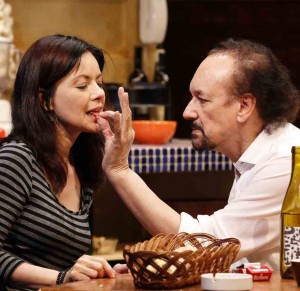‘Teresa’s Ecstasy’: A Taste for Gazpacho
Don’t think that just because the protagonist of Teresa’s Ecstasy, currently playing at The Cherry Lane Theatre in the West Village in New York, is making a menopausal pilgrimage back to Spain to visit the birthplace of St. Teresa (a Carmelite nun who was said to experience ecstatic visions) and serve divorce papers to her aging spouse that she’s on the road to enlightenment. Instead, the most satisfying thing that happens in Begonya Plaza’s script is when she and her estranged husband sit down to share a bowl of gazpacho. It’s a simple lunch, but it’s one of the best parts of the play.
Carlotta, a Spanish writer, is researching an article on the mystical 16th century saint, and on her way to Avila, St. Teresa’s birthplace, she makes a stopover visit in Barcelona to see Andres, her much older husband. He’s a tempestuous, titillating, often tiring character, and according to the canvasses we never actually see, a talented artist to boot. Enter Becky, Carlotta’s publisher from Philadelphia, who has accompanied her friend on this quest. Andres takes an instant dislike to the woman, who quickly offers to buy one of his paintings, if he will only add a little more yellow to the background.
Oh, there’s plenty of repartee that passes for communication between these three. For one thing, Andres has little patience for Carlotta’s fascination with the saint. For him, the universe began with a batch of frozen helium and Teresa was little more than an opium addict who confused her orgasms for spiritual epiphanies. Carlotta defends this chaos as “the organic expression of the divine, out of which all is created.” Becky jumps into the fray, defending Teresa as a brilliant Jewish feminist during the Inquisition. And so goes the banter.
Linda Larkin as Becky (the voice of Jasmine in Walt Disney’s Aladdin) hits just the right note of cloying charm in voice and body. Constantly changing her outfits, posing for approval from both parties, it is almost a relief when she leaves Carlotta and her spouse alone for the evening.
That’s when we get a glimpse of the two former lovers, eternally at cross purposes with Andres saying that he missed his wife, and Carlotta stating that he hasn’t. This disparity of views only continues further with Andre telling his wife that “it’s good to have someone to talk to” and Carlotta whimsically retorting in a peremptory manner, “how about someone to talk with?” Add to the menu a bite of pata negra ham from the black pigs of Spain, a sip of wine, and swearing of endless friendship, and you get a scrumptious meal of humorous joviality. In the hands of Shawn Elliott (a veteran of Broadway hits such as City of Angels and Jacques Brel is Alive and Well and Living in Paris), he allows the unflattering ravages of middle age without his partner to show. With his receding hairline and caved-in posture, every fumbling advance of Andres’ to push back the clock and win back Carlotta becomes pathetic, but somehow poignant.
Plaza, both playwright and lead, adds a sufficient amount of sensual warmth yet determination to her Carlotta. Except for a brief moment of surrender to Andres for old time’s sake, she wears her new identity and independence as the character well. Where then, does the gazpacho go sour?
It is only in the second act, after Carlotta’s return from her sojourn in Avila, that the play turns topsy-turvy. Epiphanies abound. Carlotta has a vision of herself as a child, setting her free to pursue her new life. While she’s away, Andres hears his own archangel, admonishing him for his own lack of faith. Finally, Carlotta presents us with a surprising switch of gears in her passion quest with little foreshadowing to prepare the audience. Our contemporary love story has become a soul-searching quagmire, difficult at best to digest.
Will Pomerantz as director knows his way around a stage, and his extensive background in the major regional theaters nationwide is a testament to that. He has directed world premieres by the likes of John Guare, Neil LaBute, and Craig Lucas, among others, and received his share of accolades for their productions, such as the Lucille Lortel as well as the Elliot Norton Awards. Here, he has managed to keep the attention on his actors, whether in an improvised dance step or motionless, with the skill of a musical choreographer.
The set by Adrian W. Jones is an elegant and spacious atelier—a geometrically beautiful skylight setting off the spare, but serviceable apartment. Original music by Albert Carbonell, an award-winning Catalan composer adds the right accent for the Barcelona-situated story, and one could only wish there had been more of it to punctuate the changing drama of the play.
As a screenwriter,Plaza has tackled some pretty weighty subjects from the Spanish Civil War to an Iraqi war veteran’s return. She also has professed a debt of gratitude to St. Teresa herself for her blessings, which we have no reason to doubt. She’s a talented storyteller, and we can only wish that she had let Teresa’s Ecstasy remain a play about relationships, the human variety, that is.
It’s really that simple.
“Teresa’s Ecstasy” is enjoying a limited run through April 1st at the Cherry Lane Theatre, 38 Commerce Street, New York, NY. For ticket information visit www.cherrylanetheatre.org or call 212-989-2020.

